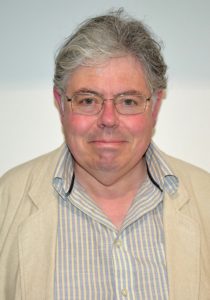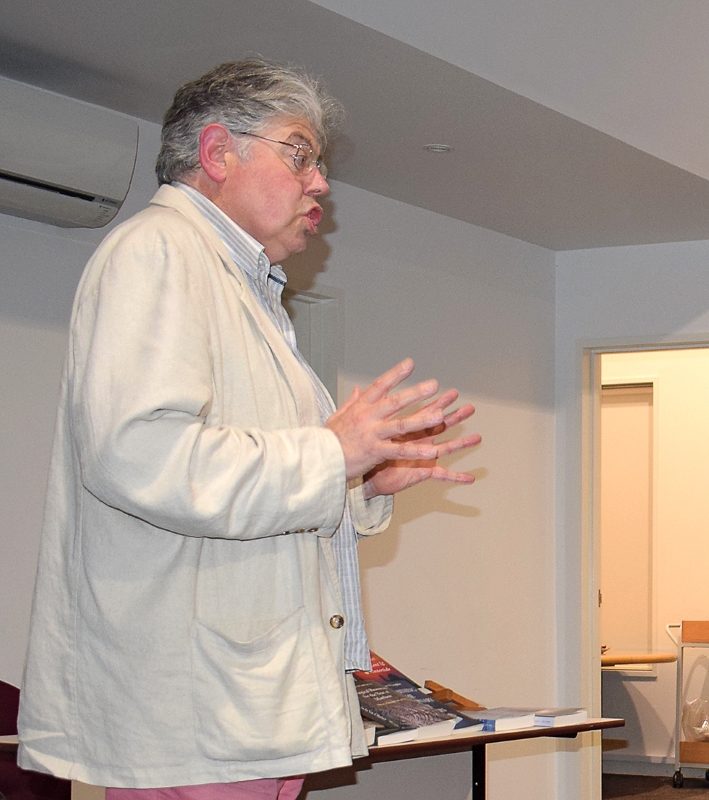During his visit to New Zealand last month, NZ Catholic was able to speak with UK-based theologian Professor Thomas O’Loughlin, and put to him the following question (His answer follows).
NZC: In the seminary, priests study theology for several years, yet by and large, out in the parishes, in homilies, one never hears much of it. One could say that homilies are not the place to be expounding upon theology, but if the people never hear theology from the pulpit, what is the point of the exercise?

Professor Thomas O’Loughlin.
Professor O’Loughlin: Can I tell you a story. Many years ago, over 20 years ago, I was walking in the Dublin mountains and realised that it was the eighth of December. Since I hadn’t to say Mass, I thought I had better go to Mass. So I popped into a church between the mountain and my home. And I saw a young man whose ordination I had attended the previous June. He got up and gave, after less than five months ordained, he gave a homily which he could have given within a week of arriving at the seminary.
And one of the problems there is that you can only appreciate theology when you are actually dealing with the questions that theology is the answer to. And if you think you can just study theology in the same way you study theory that you are going to apply, you study theory of accountancy and then you know how to apply it, then you become an accountant, to become a theologian, you actually have to live with the problems of believing in God, believing in God in Jesus Christ, and then living within a way.
And that creates questions, what does the way mean? What does following Jesus demand today? What do we mean by God? How is God present when we hear of a disaster or we see someone suffering in a hospital? You only discover theology very gradually. And it is then only when you discover the need to question the faith, that you discover you need to reflect on faith and add understanding, reflection and thought to belief.
Now the problem with a lot of seminarians is that they go into a seminary and they think they are training in the same way you are training an accountant or a nurse or somebody; that they are being formed to be an end product. And so they learn all this stuff off, and they do it as a marathon, and if they pass all the tests in the marathon, they emerge with ordination. In a sense, they think of it as just a job, it is more or less the same sort of thing you do if you are learning a new computer program.
But you only learn the bits of the computer program you need to. So very little of the theology they think they need. And then once they are out in a parish, rather than say I think now I had better start learning theology, they tend to revert back to simple answers. And we all have simple answers, and simple answers are often not good enough.
Equally, if you are going to preach something . . . let’s take another practical story. Every year, on Easter Sunday morning, between then and the Saturday of Easter week, I am waiting for an email or a phone call from someone — what sort of a God is it that kills all those Egyptian soldiers? We went to the Easter vigil, and suddenly it dawned on us — they had heard the story many times — why did God kill those soldiers? Why didn’t God kill Pharaoh? Why did he kill the innocents? They were just doing their duty. Or a child goes to Easter vigil — why did God kill the horses?
And suddenly there is another purpose of theology. As Christians we create a world, a world that is bigger than the world we see, and this world we create with story. And the story is, the whole content of the story is going way back before time of Jesus, in what people at the time of Jesus called the Scriptures and we tend to refer as the Old or the First Covenant.
Now once we start telling our stories, every new telling of the story is a different telling of the story. And it is told in a different situation to people with different questions and different worries. And so suddenly, we have to relate the way we are telling the story to the situation in which we are telling the story. That is another need for theology.
You can put a little bit of that in during the seminary, but most of it has to come up when you are out there telling the story, preaching the story, listening to people who have just heard the story and to questions. And only then can you start to say, well, what sort of a story is it anyway? Why are we bothering to read the Book of Exodus?
This morning, I went to Mass in Papakura, and we read a story that was originally told to explain why the Dead Sea was such a bizarre environment . . . . Blistering heat, configurations of salt, lumps of bitumen asphalt coming up . . . if you go down to Rotorua, you hear the story that the Maori told to explain the strange things there. But, in the book of Genesis, we hear stories to explain these strange geographical phenomena. But the strange geographical phenomena are then related to “God destroyed the cities of the plain”. He destroyed them so terribly, it was like the smoke coming out of a furnace under pressure.
Now what sort of a God is it that takes out an entire city? Now 150 years ago, people were still quite happy to say, that just shows God is a good policeman. Poor old Lot, he escapes, that’s why there is one strange town down there . . . . But his wife just looks back, she turns into a pillar of salt. What sort of God is it that does this sort of thing?
This morning in Papakura, that was the reading from the lectionary. In the seminary, you learn a vast amount about the history of the origins of the Scriptures, the history of the origins of the book of Genesis. But it is only when you are actually presented with that as a real question, you say what is really going on in that story. So again, there is a problem.
The other thing is, you teach theology in the seminary in a very insulated environment. All the class agree, they are all good young men, good Catholics. They all share a vast amount. So the amount of stuff you actually have to question is actually very limited. Now suddenly you are out in reality and you are in an office building or something. You are getting one story from Christianity, you might be getting three different Christian stories at the same time, not just a single Catholic story, you might be getting two other religion’s stories — a Hindu story and then a Sikh story, and you are getting another story called the secular story, that religion is basically a sad, confusing delusion. Now it is only when you have been in that situation, when you are answering people in that situation, that you discover another aspect of theology.
So here are three of the classic sources of theology. Real questions about God and religion and Jesus. Real questions about the history of our stories. And real questions about our ways versus the other ways. You can only understand them when you encounter them in real life. And our seminarians are taught this before they encounter them and then they are faced with a choice. They can either go down the simple route, or they can say, what I learned at the seminary is just prologue. I now have to really start studying theology. And it is only now I can start.
It is a long answer, but I hope it shows you that is a big, profound problem in thinking you can teach theology to 24-25 year olds, or to people who are not yet dealing with reality.

Reader Interactions